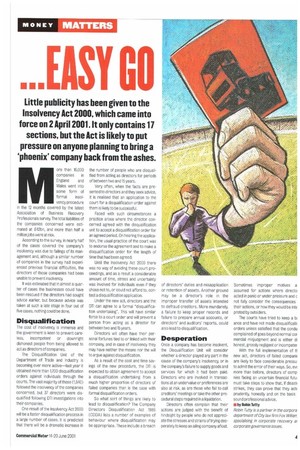Little publicity has been given to the Insolvency Act 2000,
Page 45

If you've noticed an error in this article please click here to report it so we can fix it.
which came into force on 2 April 2001.1t only contains 17 sections, but the Act is likely to put pressure on anyone planning to bring a 'phoenix' company back from the ashes.
...EASY GO
livi ore than 16,000 companies in England and Wales went into some form of
formal insolvency procedure
in the 12 months covered by the latest Association of Business Recovery Professionals survey The total liabilities of the companies concerned were estimated at £42bn, and more than half a million jobs were at risk.
According to the survey, in nearly half of the cases covered the company's insolvency was due to failings of its management and, although a similar number of companies in the survey had experienced previous financial difficulties, the directors of those companies had been unable to prevent insolvency.
It was estimated that in almost a quarter of cases the businesses could have been rescued if the directors had sought advice earlier, but because advice was taken at such a late stage in four out of five cases, nothing could be done.
Disqualification
The cost of insolvency is immense and the government is keen to prevent careless, incompetent or downright dishonest people from being allowed to act as directors of companies.
The Disqualification Unit of the Department of Trade and Industry is becoming ever more active—last year it obtained more than 1,700 disqualification orders against individuals through the courts. The vast majority of these (1,540) followed the insolvency of the companies concerned, but 37 directors were disqualified following DTI investigations into their companies.
One result of the Insolvency Act 2000 will be a faster disqualification process in a large number of cases. It is predicted that there will be a dramatic increase in the number of people who are disqualified from acting as directors for periods of between two and 15 years.
Very often, when the facts are presented to directors and they seek advice, ills realised that an application to the court for a disqualification order against them is likely to be successful.
Faced with such circumstances a practice arose where the director concerned agreed with the disqualification unit to accept a disqualification order for an agreed period. On hearing the application, the usual practice of the court was to endorse the agreement and to make a disqualification order for the length of time that had been agreed.
Until the Insolvency Act 2000 there was no way of avoiding these court proceedings, and as a result a considerable amount of time, stress and uncertainty was involved for individuals even if they chose not to, or could not afford to, contest a disqualification application.
Under the new act, directors and the DTI can agree to a formal "disqualification undertaking". This will have similar force to a court order and will prevent a person from acting as a director for between two and 15 years.
Directors will often have their personal fortunes tied to or linked with their company, and in case of insolvency they may have neither the means nor the will to argue against disqualification.
As a result of the cost and time savings of the new procedure, the DTI is expected to obtain agreement to accept a disqualification undertaking from a much higher proportion of directors of failed companies than is the case with formal disqualification orders.
So what sort of things are likely to lead to disqualification? The Company Directors Disqualification Act 1986 (ODDA) lists a number of examples of behaviour where disqualification may be appropriate. These include a breach of directors' duties and misapplication or retention of assets. Another ground may be a director's role in the improper transfer of assets intended to defraud creditors. More mundanely, a failure to keep proper records and failure to prepare annual accounts, or directors' and auditors' reports, could also lead to disqualification.
Desperation
Once a company has become insolvent, the Disqualification Unit will consider whether a director played any part in the cause of the company's insolvency, or in the company's failure to supply goods and services for which it had been paid. Directors who are involved in transactions at an undervalue or preferences are also at risk, as are those who fail to call creditors' meetings or take the other procedural steps required in a liquidation.
Directors often complain that their actions are judged with the benefit of hindsight by people who do not appreciate the stresses and strains of trying desperately to keep an ailing company afloat. Sometimes improper motives a assumed for actions where directo acted in panic or under pressure and c not fully consider the consequences their actions, or how they would be ints preted by outsiders.
The courts have tried to keep a bi ance and have not made disqualificatir orders unless satisfied that the condu complained of goes beyond normal cor mercial misjudgment and is either di honest, grossly negligent or incompeter With the full implementation of tl new act, directors of failed companii are likely to face considerable pressu to admit the error of their ways. So, evi more than before, directors of comp nies facing an uncertain financial futui must take steps to show that, if disasti strikes, they can prove that they act( prudently, honestly and on the basis sound professional advice.
• by Robin Tutty
Robin Tufty is a partner in the corpora department of City law firm Fox Warri specialising in corporate recovery al corporate governance issues.
































































































